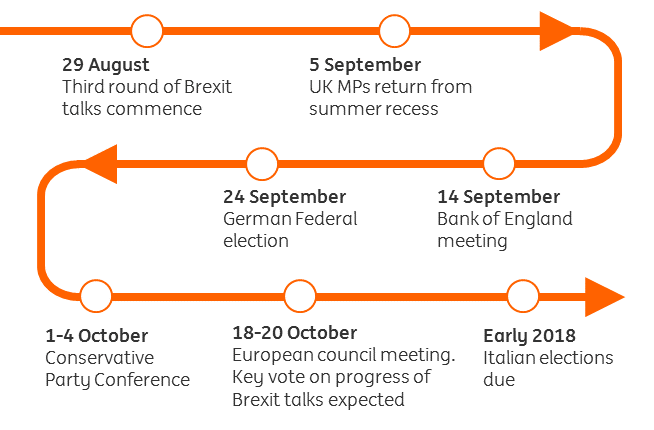Brexit latest: Ding ding, round three
The UK government seeks to ramp up the pace as Brexit talks enter round three and a crucial October EU vote on the negotiation progress fast approaches
UK position papers attempt to inject pace into Brexit talks
Brexit is well and truly back, with the UK releasing a raft of position papers ahead of the third round of EU talks next week. We looked at some of these last week, but all the latest headlines focus on the role of the European Courts of Justice (ECJ) after Brexit. The issue of sovereignty was a big talking point in last year's referendum campaign and a key feature of the UK's twelve negotiating goals released in January was that "we will take back control of our laws and bring an end to the jurisdiction of the ECJ".
Seven months on, the UK is now opting for a slightly different approach. One model being looked at is the European Free Trade Association, or EFTA court, which is currently used by the three members of the European Economic Area (EEA) to resolve trade disputes. The EFTA court is independent of the ECJ and its rulings are non-binding - although the court does interpret ECJ decisions and EU law in its judgements. This latter point has prompted some debate among supporters of a harder Brexit on whether this constitutes an end to ECJ jurisdiction in the UK.
So why the change in approach? Well, the UK appears keen to inject some pace into the negotiations ahead of an important European Council vote in October, where member states will decide whether sufficient progress has been made on key exit issues. Many political commentators have suggested that the UK's subtle change of heart on the ECJ is a sign of compromise on the UK's part to try to kick-start talks on a future trade deal/transitional arrangement.
| Five |
Number of position papers due/released by the UK this week |
What to expect from round three of Brexit talks
Despite Brexit Secretary David Davis' attempts last week to rekindle the idea of discussing exit issues in tandem with future trade discussions, the EU has been resolute that the former must be agreed before the latter. In particular, the EU wants to reach an agreement on the so-called "divorce bill" and citizens' rights.
These will be the two main issues up for debate next week and whether intentional or not, the EU's October vote effectively puts the UK on the spot. On the one hand, the UK is aware that the possibility of future contributions to the EU budget could be a key bargaining chip in the negotiations on trade. David Davis alluded to this in The Sunday Times this week, saying that the possibility of budget payments after Brexit should be discussed "as part of talks both on our withdrawal from the EU — and our future".
On the flip side, the UK is keen to move onto discussions about the future post-Brexit, and may prefer to reach a quick agreement on the budget/divorce payment in order to avoid a stalemate when it comes to the European Council vote in October. David Davis said in his Times' comments that the government is "interrogating the basis for the EU’s position [on the exit bill], line by line, as taxpayers would expect".
Whatever happens, the medium-term economic outlook hinges in no small part on when and what is agreed on the possible transitional period. Once the details are more concrete, we may see some investment return and possibly a modest acceleration in wage growth. That will ultimately have a bearing on whether the Bank of England opts to hike rates in mid-late 2018, or wait until 2019.
Key Brexit events over the next few months

This publication has been prepared by ING solely for information purposes irrespective of a particular user's means, financial situation or investment objectives. The information does not constitute investment recommendation, and nor is it investment, legal or tax advice or an offer or solicitation to purchase or sell any financial instrument. Read more
Download
Download article